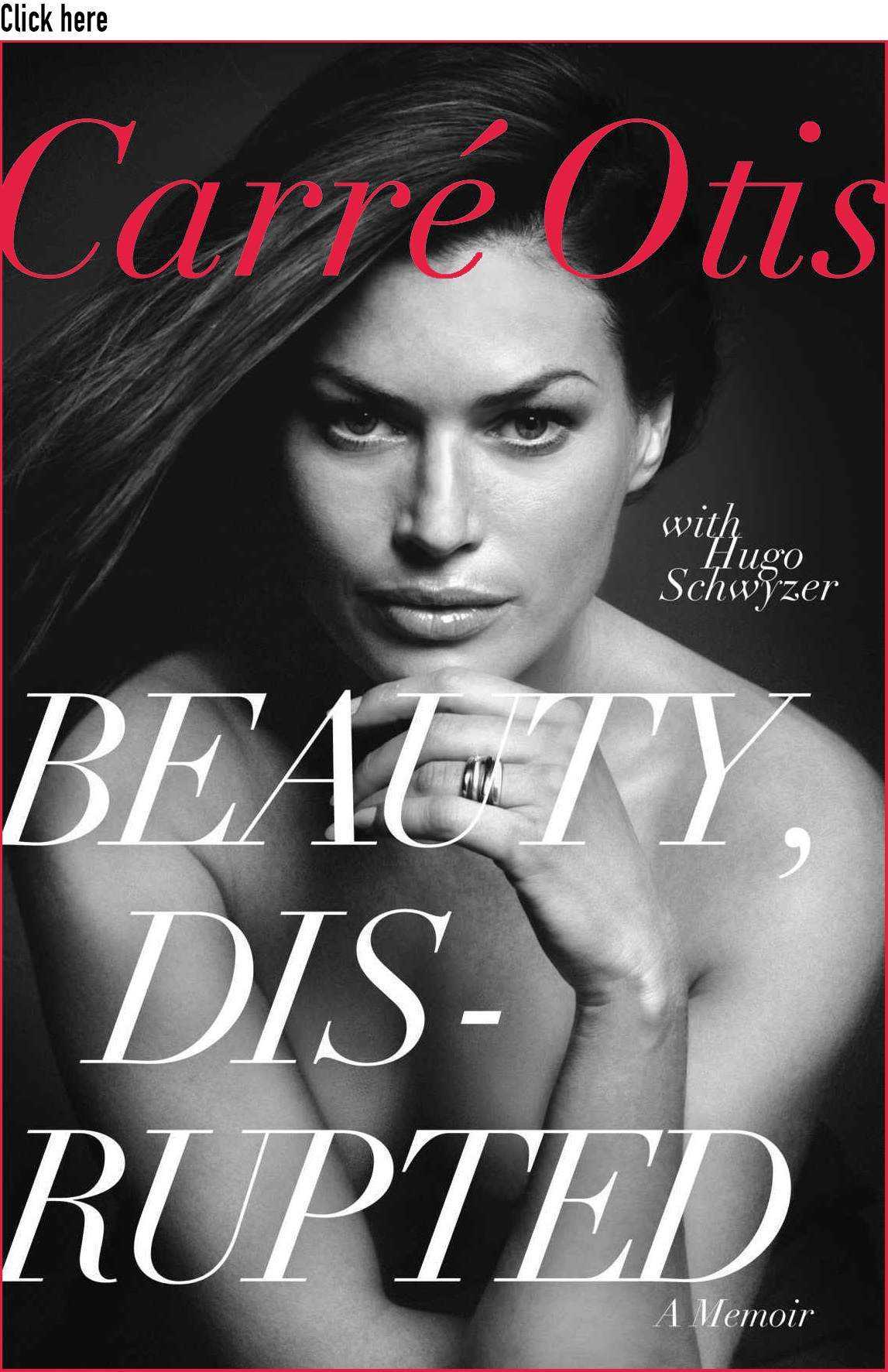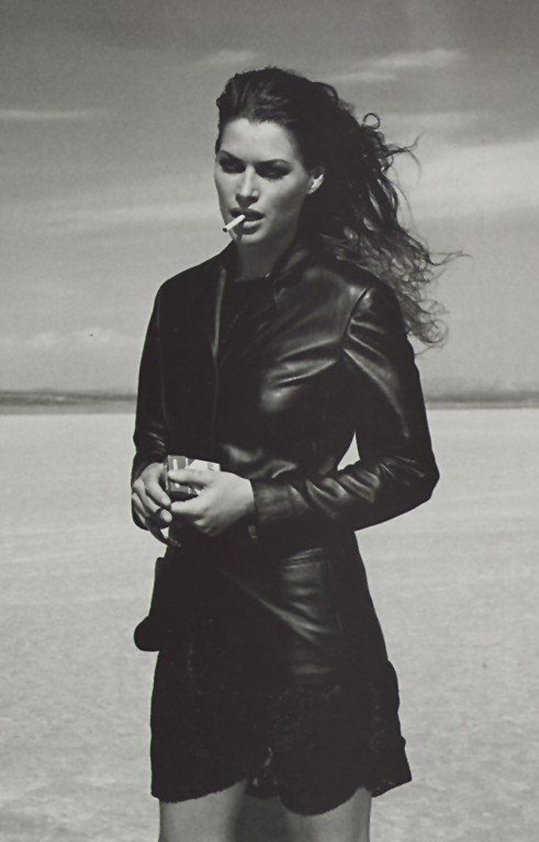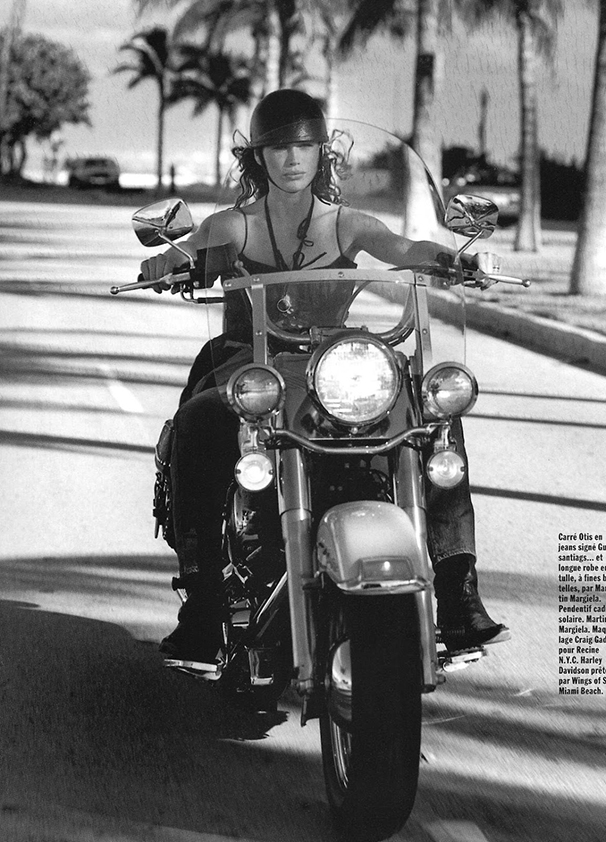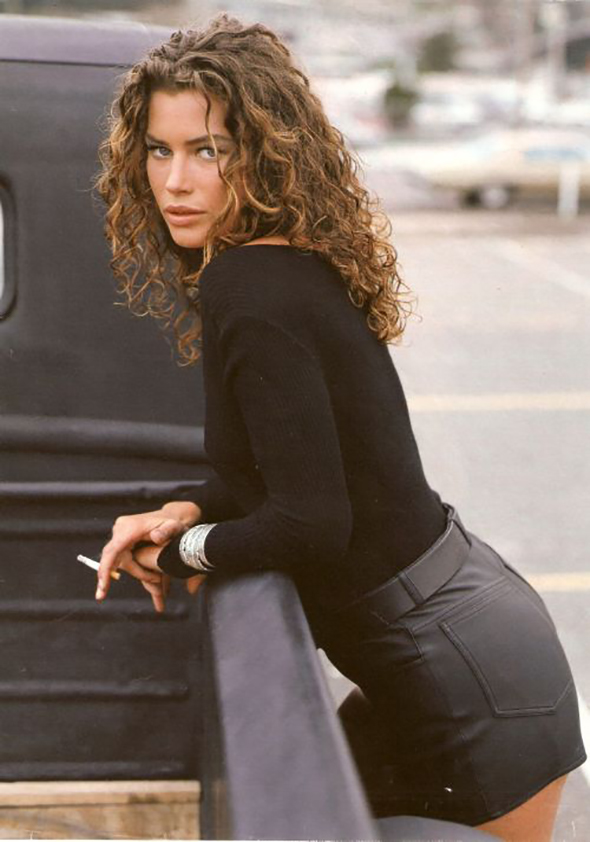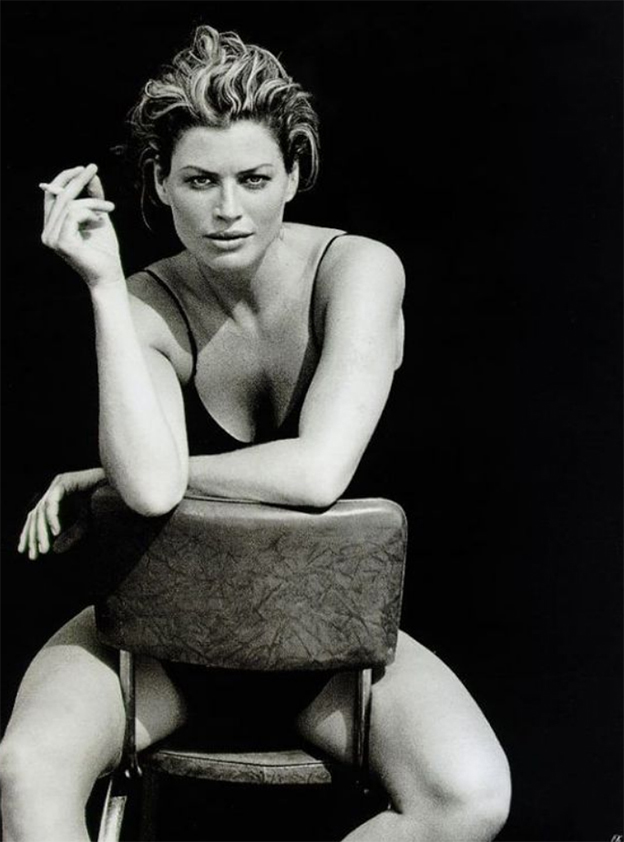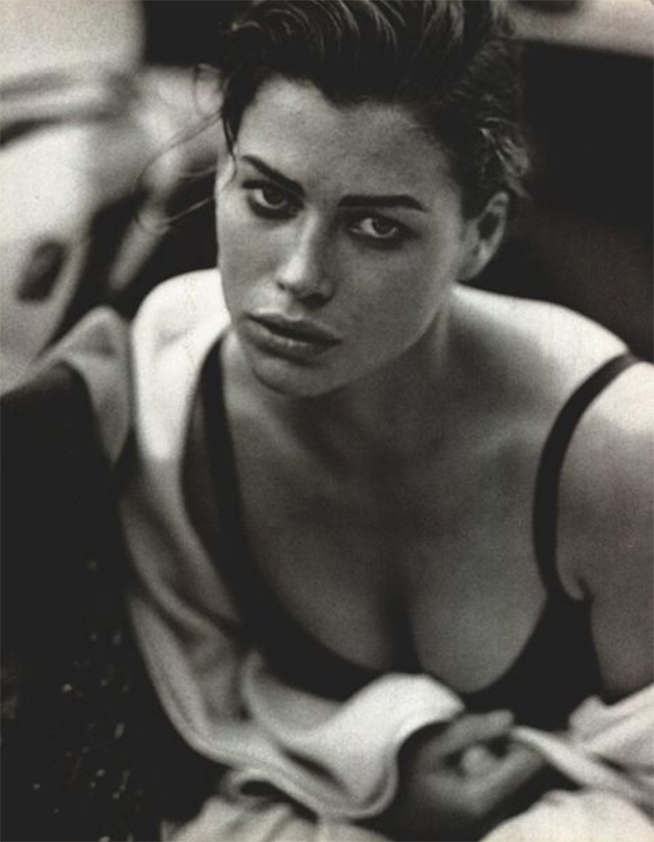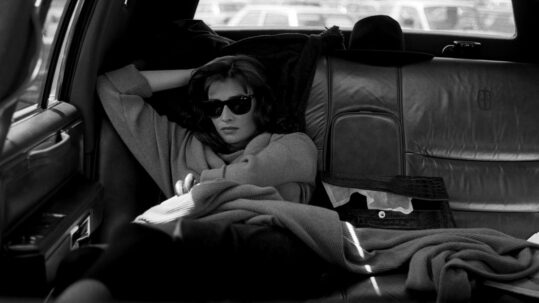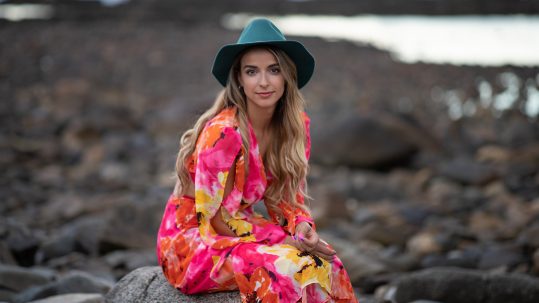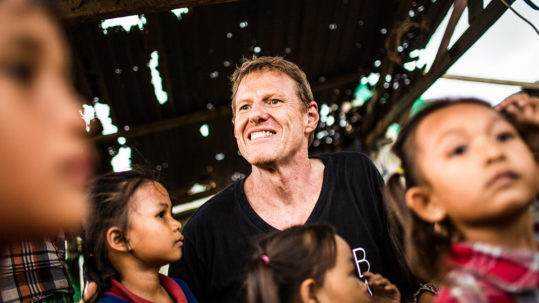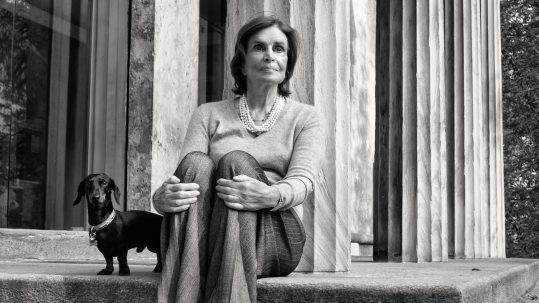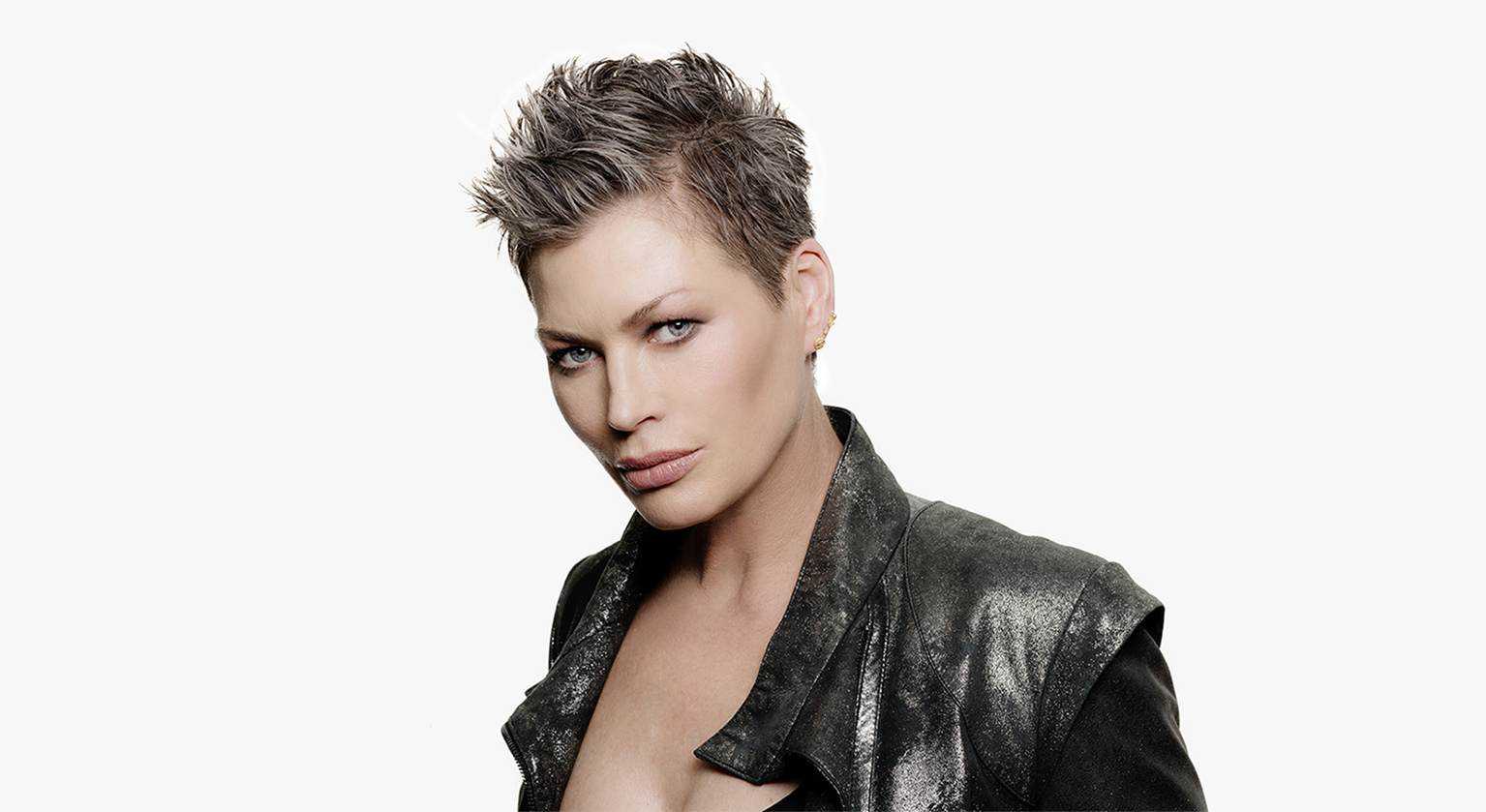
11 Feb Carré Otis
Photo by Andrew Macpherson | Jacket by Joanna Hadfield | Hair by Robert Steinken | Makeup by Alexis Swain
Carré Otis
Fashion icon, author and activist, Carré Otis spent most of her life in the spotlight. Modeling from an early age, her life quickly spiralled uncontrollably as she struggled with eating disorders and various addictions for years. A Buddhist, blessed with a new heart, a new spirit and a new life, Carré Otis is now a voice for change and a true inspiration for those in need. A wonderful conversation with a woman who found the strength to become the change she wants to see in the world.
By Victoria Adelaide | Feb 12. 2018
Victoria Adelaide: You struggled with anorexia and addictions. How did you manage to fix those issues?
Carré Otis: Many people would make the assumption that my eating disorder came from the modeling industry. But that’s not true. I think we all have a sort of predisposition for an eating disorder or not. A lot of it depends on how we grew up. We’re either empowered by these matriarchal figures, by the feminine, or we aren’t, and we watch our mothers, we watch how they relate to their bodies and to other women. And I really had a major disconnect with my family, with my mother, with growing up, with my sexuality. I was never empowered about the sacred feminine and I was never told than being a woman, being a female, is so precious. So there was a fracture really early on and sadly I became anorexic and addicted to drugs. I was already showing signs before I went into modeling; that was a coping mechanism for me psychologically. Things in my world felt so out of control; it was a way for me to manage my anxiety, my world that was out of control. I didn’t fit in at home, I didn’t fit in at school. So by the time I got into the modeling world, it was just part of the deal, I didn’t have an excuse, I had to be this skinny and if I wasn’t this skinny I was not going to get jobs. So it was just perpetuated from there and it was out of control for a long time but like so many things in this industry, it was just condoned, that was expected. People looked the other way and of course there is an element of secrecy. If you have an eating disorder, you’re not gonna be like, “I’m anorexic, I’m not eating, I’m throwing up”, it’s your secret. So, I lived with that secret for a long long time. Also I think all of those behaviors are rooted in unhappiness, you’re drinking too much, you start to do drugs, you’re just trying to manage this void within you. For me it was always because I really didn’t have a safe home, I was trying to find my way home, I was always homesick. So the first place I ever felt at home was with Buddhism. Spirituality came on to my path at 17, and it was the first time I ever felt at home and that homesickness left me. And yet it wasn’t quite enough for me to completely sink into that. I guess some of us have to go to a very very dark side and it was definitely my path I think to experience every fucking single thing I could experience out there to the full extent, and it’s part of what I fold on my path today. I believe once we are on our spiritual path, we transform these obstacles or these dysfunctions and it’s a tremendous opportunity to grow. Everything about my past, all the hardship has been an amazing opportunity. Because let’s face it, as human beings unless we have massive discomfort and suffering or a fire under our ass, we usually don’t change. And I’m a very strong-willed and stubborn woman and I really had to get a fire under my ass to change.
VA: You said at 17 you discovered Buddhism, did you grow up with any kind of faith?
CO: No, that was completely missing, and I think that was why I was so lonely, so homesick, reaching for other things that were none of that. My parents were really wounded and disconnected, and there was nothing given to me by my biological family about faith or spirituality. So it was really when I met Tibetan Buddhism at 17 that there was a connection. All of the teaching was so familiar, and it actually helped me to understand the suffering that I saw around me and that was so unbearable and overwhelming. Because I am such an intense, empathetic person, I feel things so deeply and when you’re young, and you have no context for it, it’s just overwhelming, it’s terrifying, it’s almost unbearable. Like Ram Dass said, “Bearing the Unbearable”. And how can we sit with the unbearable? We are certainly going through that as humanity today, seeing the world where it is at; it’s hard to sit with all of this unbearable stuff.
VA: Besides Buddhism and spirituality, did you undergo therapy for your eating disorder and addictions?
CO: Yes, I started to get into therapy in my twenties, when things were really bad. But it wasn’t until I had heart surgery at age 30 because of my eating disorder and 30 years of malnutrition that created my heart issue, and having a doctor asked me, “what are you eating and what are you not eating?”, that I realized how deeply this was interwoven in my being and in my life. It was a massive wake up call and it was then at 30 after my heart surgery, that I decided to go to Nepal. I left everything, the desire for a modeling career. I felt that I had to go and just be of service. I didn’t know where it would take me but it was a point where I really realized my own mortality and that what I’d been doing was so damaging to my body. Literally from the day when I set foot in Nepal, and Kathmandu was so familiar to me, I thought to myself, I know this place, I’ve been here before, I love this place. It felt like home. I reconnected with Lama Tsultrim Allione and with my teachers. And what put this into context, while doing the service work that I was doing, was that the women there were starving, and they weren’t starving to fit into a pair of jeans, I mean they were scavenging to be able to produce enough milk to feed their babies. What had been a leisurely self-obsessed existence, all of a sudden was put into a global context, and this led me to realize that I had missed the point of my purpose in this lifetime. So I hung out with friends, with the Nepalese and I went back 4 times. During that period I began to study with my teacher; I did my Ngöndro so all my foundational practices. I was going to take my robes as a Tibetan Buddhist nun and I did; I took a 5-year celibacy vow. I felt that I needed to figure out who I was beyond the construct of who I thought I was and what society has said I should be. So I completely pulled back and went on this solo journey and it was the biggest gift that I gave to myself.
VA: Did celebrity also lay an heavy weight on your shoulders, and keep you in a place where it was hard for you to talk about what you were going through?
CO: You know it’s funny, celebrity then wasn’t even what it’s like today. I mean, even then it was such a dualistic experience, it wasn’t even celebrity; it’s how humans view humans. It’s how women looked at me and made assumptions, it’s how men looked at me and made assumptions; it didn’t even matter that I was working as a model, but just the way I looked, based on my looks. I have always had so much to say, I’ve always been outspoken, and there’s always been this view that says, “What are you complaining about? You are this beautiful person, who is super entitled, you have everything!”. But you can’t look at somebody and assume that you understand what the person wants and needs. I’m grateful for all of the opportunities I’ve had, I had times when I had money and times when I had no money; I’ve been in a rental place, totally making ends meet. So, I have pretty much experienced every end of the spectrum, definitely. Celebrity was hard because there were so many assumptions put on me. People would assume that they knew me, and when you’re still trying to figure out who the hell you are, you don’t even know yourself (laughs). But people are also giving you the opportunity to figure out who you are, because they’re making an assumption. So I think that was the most challenging thing about celebrity; there’s an alienation, an isolation that you go through, you’re not perceived as a regular person, when in fact, you really are, we are just all regular people. Come on!
Photo 1: Cosmopolitan US November 1998 | Photographer: Tiziano Magni @ Print & Contact | Stylist: Enna Halie | Makeup: Yuki Wada | Hair: Dennis Lanni
Photo 2 & 3: Magazine: Vogue Paris April 1991 | Photographer: Tiziano Magni @ Print & Contact | Stylist: Martine de Menton | Hair: John Sahag | Makeup: Greg Gadson
Photo 4: French Elle April 1991 | Photographer: Tiziano Magni @ Print & Contact
VA: What is your view on modeling and on all this show-business industry today?
CO: Well, what I can say is that what we are discovering within this industry is the same in every industry, as is the case in politics. It is so important for women to speak out, to identify and say there has been a behavior going on for over a hundred years in all these industries that has been accepted and considered normal. I have two daughters, I don’t want them to ever normalize being raped, being hit on sexually in the work place or in any other situations where they are not consenting. It shouldn’t be normalized and those are the issues I spoke about in my book in 2011. I spoke about it, I named names, and it wasn’t received as a New York Times Bestseller because it was premature and nobody wanted to have this conversation in 2011. I was labelled insane when I said it, but the modeling industry it’s a huge way of trafficking humans. This is a mostly unregulated industry, working with children, working with minors, when any other industry or any other sort of corporation has mandatory sexual harassment training. Why on earth are we not holding the entertainment industry, especially the modeling industry, to the same code of ethics and standards for human health and safety as other industries? It’s by law, it’s built in to their overhead. I just said to my husband the other day, as I have been focused on this and I recently went to show my support to some congressmen, that this is like the Catholic church. This is not a witch hunt and it can’t be. I have a certain empathy for a generation of men and women that didn’t know better, they were not taught better; it was normal for them to slap somebody’s butt in the work place or say “hey baby you’re sexy”! What I’m asking and what I’m saying is that if we still have perpetrators in the work place, which we do, and it wasn’t just Harvey, there are others, those perpetrators should not be employed, especially they’re working with youth; if they’re not going to keep their d*** in their pants, they shouldn’t be working around kids. I mean it’s the same thing with the Catholic church, if you have somebody who is actively trying to get to small children they shouldn’t be a priest in the Catholic church. I think we need to have an element of understanding and I keep asking my male friends who are older than me, they need to upgrade the way they view the world. I can’t shout out any louder, we can’t raise anymore red flags. It is a time to ask our brothers, our fathers, our lovers, our husbands, to stand with us and to make whatever adjustments they need to make in how they view the world. I’m sorry if it makes people uncomfortable, but it is time for all of us to make some changes. And women too. Women have been tearing each other down for so fucking long! I am like, “sisters get on the same show, let’s support each other instead of nitpicking and doing these other things”. So I think in a way we’re all complicit and we all have to look at how can we do better. It’s our responsibility as human beings, globally.
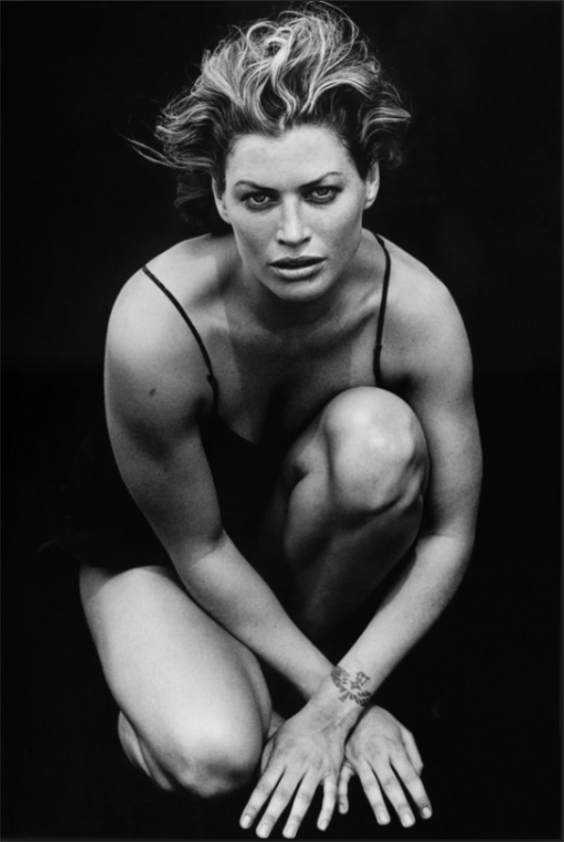
Photo by Peter Lindbergh.
VA: You said that as a young girl you were not told about self esteem, about loving yourself. Do you think society also play its part in this lack of awareness?
CO: Yeah, I think what is put upon us by society and culture is unfair, both for boys and girls. There is a role that we are expected to play and then it stops us from really realizing our own essential true nature. It’s like my children they’re in Waldorf, I am going to protect their childhood for as long as possible. You’re a child you have been forced to grow up and deal with really big issues way too soon, way too fast, and you can’t possibly know where you’re going, who you’re going to be and what you even want before society tells you, “this is who you are, this is what you should look like, this is how you should feel about yourself, this is what you should want for your human life and existence”. And it’s bullshit, it’s such bullshit. Once upon a time in our tribes, in our communities that we don’t have any more, we were given this sort of initiation by our elders, step by step, this discovery of ourselves, of who we are and our sense of purpose in this life time. And when you have a sense of purpose, it’s so fulfilling, true purpose in your heart, and right now I think so many kids don’t have that. I mean between governments, political issues, climate change, it’s a scary time to be coming into this world. There is a fracture and this comprehension of developing a relationship with ourselves is so important and until you do that, you don’t have a barometer of what you want, of what’s good for us. Nobody told me I could say no, about anything. So until my late twenties, until I had good therapy, it dawned on me and I thought to myself, “Oh my God I can actually say no, and if it makes somebody uncomfortable it’s not my problem, I don’t have to fix it”. But it took me years of therapy to be able to have that understanding, it’s a shame that this wasn’t instilled in me when I was a youth. There are many paths that I wouldn’t have had to go down; there’s a camaraderie in sisterhood, there’s a camaraderie in community that we need.
VA: How did your journey impact the way you raise your daughters?
CO: It’s huge. About 10 years ago I started working with indigenous elders both from Peru and from Africa, and I’ve been working in sort of sacred traditions, I went to Africa and I was initiated last summer, and I will be going to Peru. I’ve been working within these ancient sacred traditions for the past decade, and it really informed me in terms of community, in terms of sustainability and in terms of my relationship with my children. It takes so much to raise my daughters differently and in a conscious way, I feel so honored and so blessed to work with these amazing teachers I work with. They are part of my girls’ lives, so they are really well informed in terms of mindfulness, in terms of emotions; they are valued. I want to hear how they feel in terms of food; for us food is nourishment, it’s what fuels the body. They don’t know the word diet. I’ve made a conscious choice to bring my children up in a Waldorf school, so it’s nature based, it’s plant based, none of my children has access to media, a cell phone, a computer until they’re in high school. So ritual and spirituality, and they can choose to follow whatever teaching they want, they are just being raised in a conscious way that really honors who they are as individuals and what they want to explore on their spiritual path. So it’s a very different awesome upbringing, they’re really well adjusted, they look you in the eyes and shake your hand, they’re heard at home and their questions are answered. So my spiritual path has been the biggest thing that informed me as a parent.
Photos by Peter Lindbergh.
VA: You recently started working with a new agency, ‘Iconic Focus Models’; how different is it today?
CO: Well, I got in touch with Iconic through a friend, I’m turning 50, my hair is silver, and my feeling was that if I can go out and represent my age demographic realistically, I want to. It’s part of us being empowered; I’m not going to dye my hair, I’m not going to get a face lift. I am who I am. Why wouldn’t we have realistic representations of all, gender, color, age, the whole thing? I think that’s what the industry needs to have in place, a realistic representation of us all. And I just said to Iconic, first you have to read my book, you have to understand that I’m not quiet; I’m going to say things that ruffle feathers, this is me. I don’t need to work, my husband’s retired, he’s great, he supports me; I don’t need to work but I feel like it’s part of my path. The biggest path I have is my service work, I mean it is really holding the space for others to step into their power, their authenticity, and this is the role model that I am today. If there is a job that makes me say, oh my God, that’s what I want to represent me , then I will happily take that role, but I will not compromise any part of myself. So that’s really different. In the past they really had to compartmentalize these different pieces of me and it’s just ridiculous, I can’t do that (laughs) and I don’t have to. So Lori, Jill and Patti were a really good fit and they said, ok we got it, so I said, “Good!”. I’ve been in this business for 30 something years, I’m not looking to get back in as a model, that’s not what I’m doing, I’m pretty vocal (laughs).
VA: What would you say to the young Carré Otis if you could reach out to her?
CO: I would say don’t be afraid to shine and to step into your power and to say no, and speak up for yourself. Speak up when things don’t feel right, identify and ask for what it is that you need. We are honorable, we’re deserving of that quality, of that right. I think there are a lot of young people who don’t know that they can and should do that. But that’s what forms and informs our lives in the path that we follow. They don’t feel worthy, I know I didn’t feel worthy.
VA: Most importantly are you happy?
CO: I’m so happy! I have the most incredible partner, husband, father to my amazing children. I was actually working out this morning and I was thinking, I can believe my life but I also can’t, I mean it’s the life I would have imagined for myself when I was in the darkest place. This is exactly where I am today. Especially this role that I’m taking on, just getting out there, perpetuating, continuing the dialogue about the fact that I believe every single being on this planet should not have to deal with sexual harassment, should not have to deal with abuse. We all deserve dignity and respect. And I am championing that, not just within the entertainment industry but in all industries, and obviously I have to start where I walked and where I’ve seen the offences first hand. You know, it was a big deal to go and testify, to speak with the press and people in congress, to share stories of rape and all of that. I will continue to be a voice and this too makes me happy, this is how I can be of service and to me the greatest way of giving back is when I can serve others. Also I should mention that I worked for the past year to create thebluelotusfoundation.org and it’s an eating disorder prevention, it’s evidence based eating disorder prevention. I’m focusing on youth, I’m focusing on entertainment, on modeling, on agents, anyone who goes through some sort of comprehension and training about eating disorder prevention because there are things that we can do to empower our folks around us as opposed to oppressing them. So yes I’m happy.
**Mrs. Carré Otis is represented by Iconic Focus Models
...to me the greatest way of giving back is when I can serve others``.

